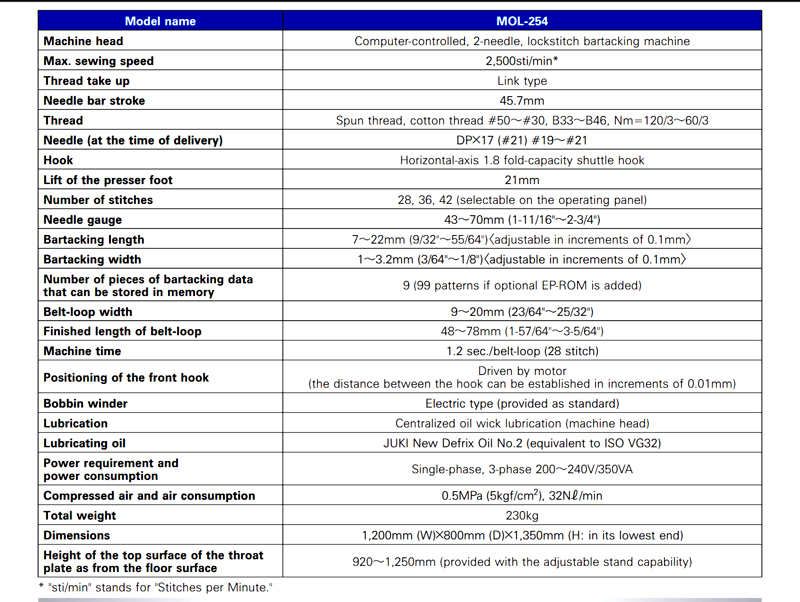Automatic 2-needle Belt-loop Attaching Machine
MOL-254
The machine time is 1.2 seconds per belt-loop, which ensures increased productivity. The feed mechanism incorporates a computer-controlled X-Y method to allow the operator to change the number of stitches and sewing sizes.
The new machine head specifically developed for belt-loop attaching machines runs at a maximum sewing speed
of 2,500rpm and is equipped with a direct-drive system that improves start up performance and shortens sewing
time. The belt-loop feeding device is now provided with a halfway standby capability for subsequent belt-loops,
and its faster belt-loop supply action shortens the time required for supplying belt-loops and helps speed up the
machine time to 1.2 seconds per belt-loop (with 28 stitches).
Belt-loops are fed out by the conventional gear-roller feeding mechanism and also drawn out by the new drawing
mechanism on the clamp device. Supported by these two mechanisms, the folding fork catches “curled” or
“creased” belt-loops every time and supplies them to the head. In addition, the sensor of the clamp device
detects the presence/absence of belt-loops. If it detects a faulty belt-loop feed, the clamp device automatically
repeats the clamping action. Since the operator doesn't have to operate the set-back switch, less time is lost.
The machine quickly and reliably disposes splices without any
delays in cycle time.
The machine preliminarily detects each splice in the belt-loops
and efficiently disposes them. This means that even when the
machine carries out the splice-disposal procedure, the belt-loop
feeding device can complete its belt-loop supply action and
supply the next belt-loop well before the machine starts to sew.
As a result, the operator can perform rhythmical and efficient
sewing work with no delay in cycle time. By detecting changes
in the material thickness, the machine's potentiometer finds
splice in belt-loops and disposes them perfectly.
When changing the material to be sewn, the change in the
material thickness recognized by the potentiometer as a splice
can be easily adjusted and programmed through the machines's
teaching function.
The standard machine incorporates a 1.8-fold capacity shuttle
hook. The shuttle hook improves efficiency by reducing the
frequency of bobbin thread replacement.
THE MACHINE OFFERS IMPROVED FLEXIBILITY.
The newly developed machine head comes with a computercontrolled X-Y linear feeding system which enables to program the
number of stitches and size of bartacking.
The number of stitches to sew a belt-loop can be switched between; 28-, 36- and 42-stitches, and the
bartacking size can be easily changed through the operating panel. What's more, the user can create his/her
own original sewing patterns in addition to the standard ones using JUKI's PGM-20 programming software
developed for computer-controlled sewing machines.
Simple adjustment of the machine enables changeover of the cutting
method between cross cutting and straight cutting.
The applicable loop width for the cross-cutting device is increased. In this model, both the cross-cutting
device and the straight-cutting device can now cut loop up to 20mm width.
THE MACHINE OFFERS IMPROVED OPERABILITY,
An electric sliding mechanism is installed in the front hook
The newly incorporated electric sliding mechanism is used to electrically shift the front hook when replacing
the bobbin or conducting maintenance on nearby components in order to widen the space between the
hooks and facilitate the job. In addition, when changing the needle gauge, the front hook can be finely
positioned in increments of 0.01mm through the operating panel, thereby allowing the operator to easily
adjust the distance between the blade points of the two shuttle hooks. Since the machine no longer requires
any adjustment in the hook timing (phase), needle gauge adjustment is much simpler than ever before
(near the operator).
To enable computer-controlled belt-loop supply performance, the
machine has adopted a servomotor-driven belt-loop feeding device that
feeds the belt-loops to the sewing position (i.e.,under the presser foot).
The belt-loop feeding position is automatically adjusted to the belt-loop width. With this capability, the beltloop width can be easily changed without mechanical adjustment. In addition, when feeding the belt-loop
under the presser foot, the widthwise position of the belt-loop can be offset through simple manipulation of
the operating panel.
To improve workability in replacing belt-loops, the belt-loops
insertion opening through which belt-loops are supplied to the
feeding device is now located on the front side of the main unit.
The operator can visually check how the belt-loops are fed during sewing and prevent possible troubles in
the bThe machine is equipped as standard with an adjustable stand.
elt-loop feed due to faulty loop-feeding paths.
The height of the working table can be easily adjusted to match the operator's height.
The operator can carry out sewing works in a comfortable posture with less physical strain and fatigue.
